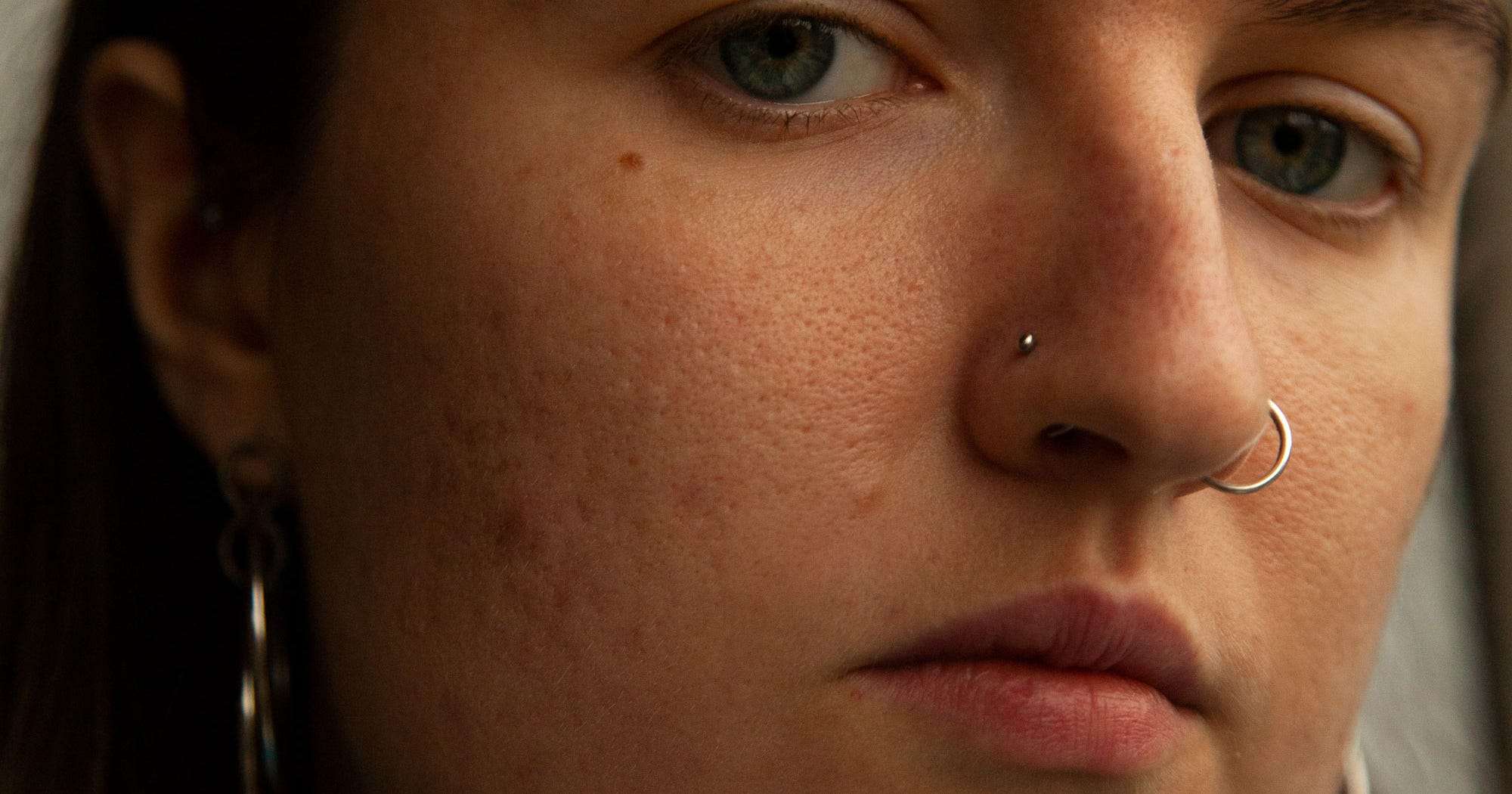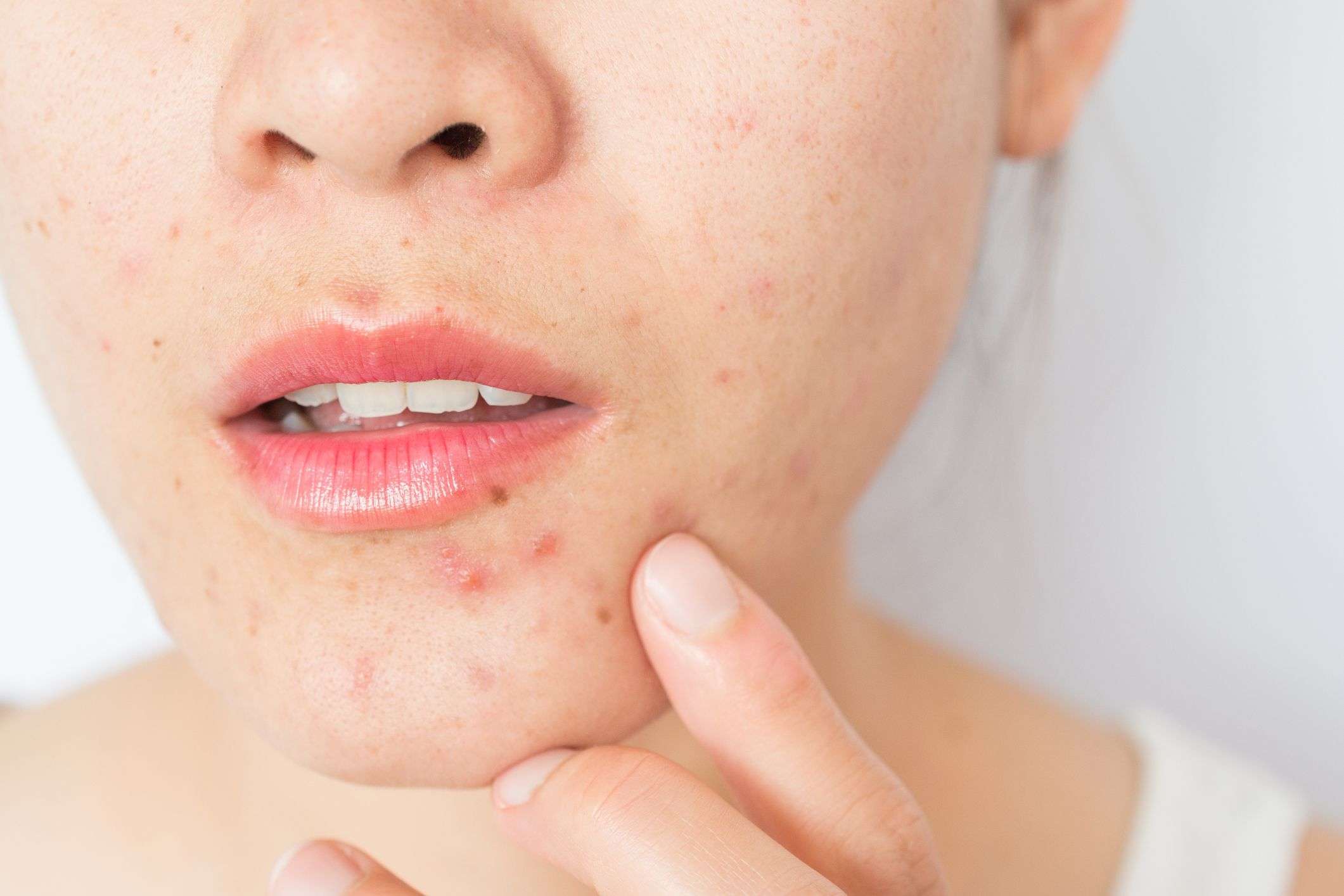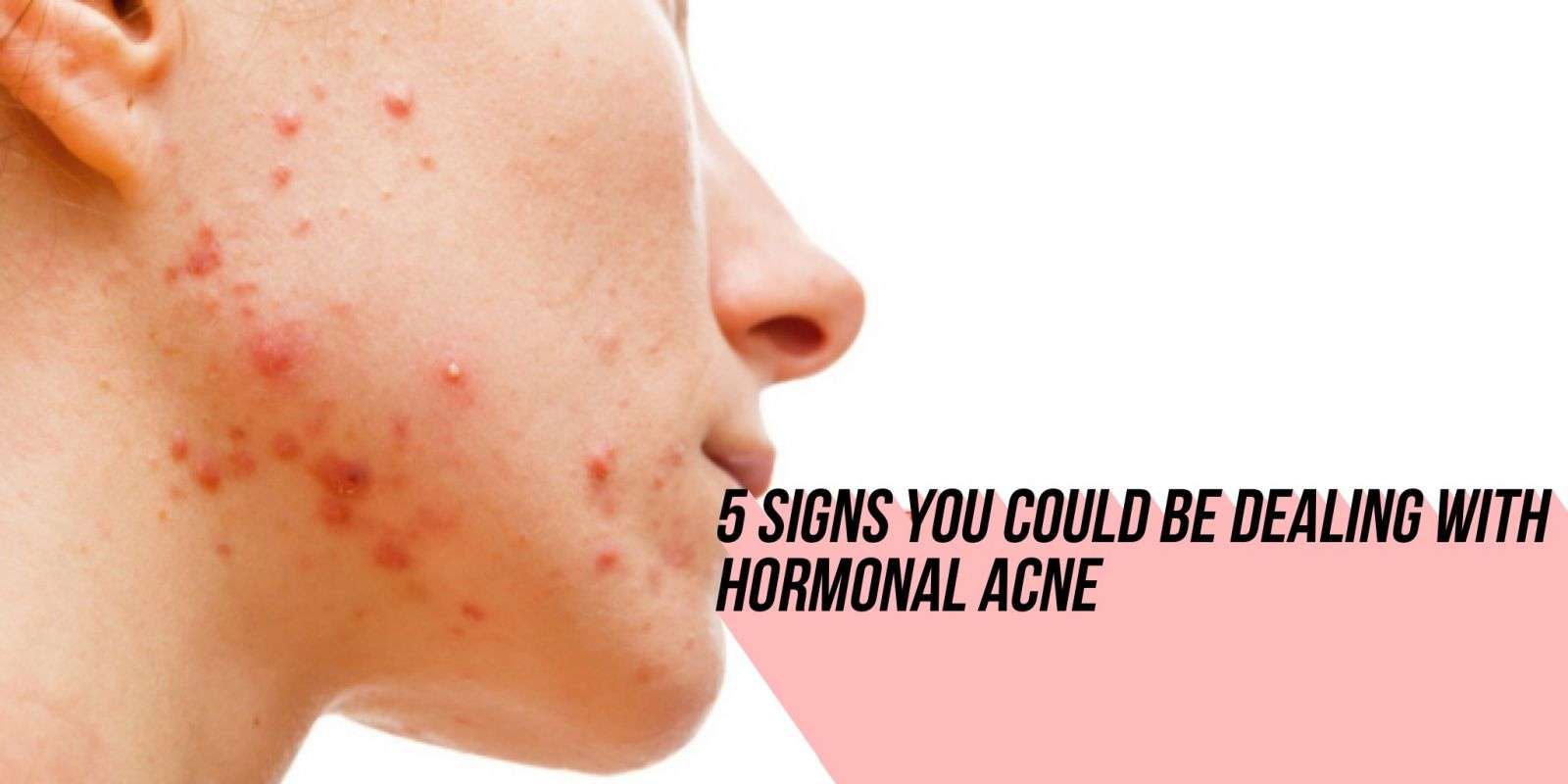Try An Oral Contraceptive To Balance Hormones
If you’re comfortable and if a gynecologist says you’re a good candidate, oral contraceptives can help balance out your hormones, including those that are responsible for acne. Zeichner says that the best prescription options for hormonal acne are birth control pills and Spironolactone . Birth control pills help regulate your hormones and decrease testosterone levels, which can mean fewer hormone-induced breakouts. Zeichner notes the four birth control pills currently approved for acne: Yaz, Beyaz, Ortho Tri-Cyclen, and EstroStep.
Another option is the aforementioned Spironolactone. Though not specifically designed to treat acne, it is often used for exactly that purpose because it prevents testosterone from stimulating the oil glands. “Less oil means less shine, fewer clogged pores, and less food to feed acne-causing bacteria,” Zeichner explains.
“Certain oral contraceptives have even been approved by the FDA to be used in the treatment of acne,” explains Fenton. “If you are already on birth control or thinking of going on it, make sure to ask your gynecologist for an oral contraceptive that will also help your acne.”
“In addition to clearing existing acne, Differin Gel will also help to prevent future breakouts from forming by increasing skin cell turnover to minimize clogging of pores.” Additionally, Fenton recommends using an OTC acne wash and non-comedogenic moisturizer regularly.
What Is The Best Topical Treatment For Women With Hormonal Acne
The same as teen acne adult acne treatment should be personalized to the skin type and acne and acne severity type. The best topical ingredient for mild hormonal acne is salicylic acid, retinol, niacinamide, and benzoyl peroxide for moderate acne. Benzoyl peroxide is regarded by the American Academy of Dermatology as the best FDA-approved single anti-acne ingredient. It is frequently more effective than any other over-the-counter prescription acne medication. Unlike adapalene , they are often very irritating new preparation of micronized benzoyl peroxide 2.5% can be used on acne-prone and sensitive skin without significant side effects.
The best cleansers for women with hormonal acne include a low percentage of salicylic acid. Salicylic acid at a concentration of 0.5% can help unclog the skin pores without over-drying the skin. Plant-based ingredients can further help fight skin inflammation and reduce the dryness and redness frequently associated with regular anti-acne cleansers.
Choosing the right moisturizer is crucial for women with hormonal acne. Anti-wrinkle moisturizers can increase the risk of acne breakouts. For best results, look for moisturizers oil-free and specially formulated for acne or acne-prone skin people. Women with normal – oily skin can benefit from an active moisturizer with niacinamide, and women with drier skin can befit from a more hydrating moisturizer.
What Is Hormonal Acne And How Can I Treat It
- Reviewed By: Julie Lamonoff, CNM, OBGYN-NP, Shannon DeVita DNP, FNP-BC, CPNP-PC
Everyone tells us that acne is supposed to go away after puberty is over. In an ideal world, this would be true.
In our world, acne breakouts can and do happen well into adulthood. If you’ve noticed your acne flaring up around the same time each month , you may be experiencing hormonal acne.
Read on for a breakdown of what hormonal acne is, why it happens, and what you can do to get rid of it and get back to your life.
- Takeaways
- Hormonal acne happens when hormone fluctuations create the perfect storm for clogged pores.
- The good news is hormonal acne is usually treatable.
- Treatments range from over-the-counter cleansers to prescription medicine to topical creams.
- There are things you can do at home to help prevent breakouts.
Recommended Reading: Nugenix Estro Regulator Reviews
Hormonal Therapy For Adult Women With Acne
Treatment for acne in adult women is the same as for other people. Further options include hormone therapy.
These include the contraceptive pill as it can help to clear acne in women. Those approved by the FDA contain ethinyl estradiol.
An oral contraceptive can be used alone or with an anti-androgen medication.
Oral contraceptive pills should not be used by those with certain health conditions.
These include:
What Is The Best Diet For Women With Menopausal Acne

Most dermatologists agree that diet plays a role in acne. Although the exact effect of food on acne is not apparent, it disbelieved that reducing cows milk dairy and high glycemic food and refined carbs can help with acne treatment and reduce the frequency and severity of acne breakouts.
Try to limit alcohol and caffeine and ditch the junk food. To improve your skin and reduce your acne breakouts, look for foods rich in the fatty acids omega-3 and 6, such as oily fish and chia and flaxseeds, and fill your diet with whole-grain, fiber-rich products. Cruciferous vegetables such as spinach, cabbage, broccoli, and cauliflower are beneficial because they contain a DIM compound that helps with hormonal balance. You can also look for DIM supplements .
Drink a lot of water. Dehydration makes your skin rough and dry. When the skin too dry, the skin oil glands produce more oil to moisturize the skin. The excess of skin oil mixed with the dead skin cells clog the skin pores and can cause more acne.
Recommended Reading: Can Having Your Tubes Tied Cause Hormonal Imbalance
Green Tea May Decrease Acne Lesions
Green tea contains potent antioxidants and has been shown to possess powerful anti-inflammatory effects .
Research indicates that supplementing with green tea may benefit those with acne.
A study in 80 women with moderate to severe acne demonstrated that those who supplemented with 1,500 mg of green tea extract for 4 weeks experienced significant reductions in acne lesions, compared with a placebo group .
Green tea extract is widely available, but be sure to speak with your healthcare provider before trying a new supplement to treat your acne.
Does Stress Cause Hormonal Acne
Researchers have found that stress and acne are related. In response to stress, our bodies produce cortisol that elevates the secretion of androgens. Androgens stimulate the sebaceous glands that open onto the hair follicles in the skin, causing acne. Reducing stress plays a vital role in hormonal acne treatment.
Any of the causative factors mentioned above can lead to oily or greasy skin due to increased sebum production, which is present at the root of the hair follicle. The overproduction of sebum leads to a blockage resulting in clogged pores called comedones. These comedones are made worse by new skin cells or local bacterial infection. The presence of black or whiteheads is also evident at the tip of the comedones.
Simple acne, commonly known as pimples, becomes pustules when they become infected and filled with pus. They may continue to grow and becomes nodules and cysts due to infection.
Recommended Reading: Does Melatonin Cancel Out Birth Control Implant
Other Supplements That May Help
Aside from vitamin D and green tea extract, the following supplements may help reduce acne symptoms:
- Fish oil. Some evidence suggests that supplementing with omega-3-rich fish oil may reduce acne severity in some people. However, the results are mixed, with some people experiencing worsened symptoms (
- ).
Summary
Vitamin D, green tea extract, B vitamins, and zinc are just some of the supplements that may benefit people with acne.
Root Cause Of Hormonal Acne #: Gut Issues
The gut is the center of EVERYTHING in our bodies. Gut issues dont only cause hormone imbalances, but they are also a sign that something is off with your hormones.
The digestive system and endocrine system are so closely intertwined it can be hard to see where one ends and the other begins.
Your gut helps create and detox hormones out of the body, so problems with gut function can lead to hormonal issues. Both too little hormones and too many hormones can be the result.
Hormones also control some of the functions of the gut . Thats why some women experience diarrhea and constipation around their menstrual cycle.
The bottom line is if youre having digestive issues or hormonal issues, you must consider taking action on improving the health of your gut.
You May Like: Cat Ate Melatonin
Does Progesterone Cause Acne
Yes, fluctuation in the levels of sex hormones during your menstrual cycle may also contribute to acne before your period.
Progesterone levels rise during the middle of the cycle. This may stimulate the sebaceous glands in the skin. However, the role of progesterone in sebum production is uncertain.
Increased progesterone may also raise your body temperature and worsen sweating, leading to clogged pores. This buildup of sebum beneath the skins surface along with dirt, dead skin cells, and bacteria results in breakouts of acne before and during your period.
The Ordinary Granactive Retinoid 2% Emulsion
Delivering a potent, deep-absorbing dose of the brands advanced retinoid active complex directly to your skin, The Ordinarys Granactive Retinoid 2% Emulsion supports your skins natural regeneration process and promotes cell renewal, which helps those suffering from hormonal acne by speeding up the healing time of their breakouts. It also removes dead skin cells and other pore-clogging agents from your skin.
Recommended Reading: Nugenix Estro Regulator Side Effects
Heres How To Get Rid Of Hormonal Acne
Before you get downtrodden about the finicky nature of hormonal acne, know first that its pesky, but perfectly normal. So normal, in fact, that there are many methods to help treat it.
Most people with hormonal acne have tried over-the-counter treatments to no avail. If they arent working for you, you may need to seek the help of a dermatologist, who can offer prescription hormonal acne treatments. In general, its a good idea to see your dermatologist if you have deep or cystic pimples, because they could be a marker of something more serious, such as a thyroid condition or abnormal hormone levels, adds Jegasothy. Keep reading to learn how to treat hormonal acne.
The hormonal acne treatment pyramid starts with good over-the-counter cleansers. When choosing yours, there are a few key ingredients to look for:
In acne patients of any age, most dermatologists will consider topical retinoids as the first step for treatment of mild to moderate acne, especially when its hormonal. Retinoids help your skin slough off dead skin cells at a more normal rate so the dead skin cells don’t bind together and clog your pores, explains Peredo. They are the preferred avenue for long-term treatment because of the limited severe side effects and are known for preventing new acne in the long term.
Related:
What Is Menopausal Acne

Menopausal acne is when acne appears in women in their 40s and 50s. The cause of menopausal acne is a decrease in estrogen levels or an increase in androgen hormones like testosterone in menopause. Some of the hormonal treatments for menopausal symptoms can also cause hormonal acne. This is especially common in women taking a progestin.
Also Check: Does Nugenix Have An Estrogen Blocker
Traditional Treatments For Hormonal Acne
Unless your hormonal acne is mild, over-the-counter products usually arent successful.
This is because hormonal acne typically takes the form of cystic bumps. These bumps form deep under the skin, out of reach of most topical medications.
Oral medications can work from the inside out to balance your hormones and clear up the skin. Common options include oral contraceptives and anti-androgen drugs.
What Does Hormonal Acne Look Like
Whiteheads, blackheads, papules, pustules, cysts and nodules are all common hormonal acne symptoms. Normally, whiteheads and blackheads do not cause pain, inflammation or swelling, but if they do, then they are most likely forming into cysts and pustules. If you do not know what a cyst is, it forms underneath the skin. It is typically tender or sore to the touch. Inflamed acne can cause redness, swelling, soreness and pain.
While hormonal acne can appear anywhere on your body, typical places depend on your age and health. Teenagers tend to have these lesions on the T-zone . Adults who are 20 years or older have breakouts, usually at the lower parts of their face like the jawline, chin and bottom on the cheeks. However, hormonal acne can appear on the neck, back, shoulders and chest as well.
Don’t Miss: Nugenix Estro Regulator Review
The Food And Hormonal Acne
If sugar has gotten a bad reputation, you may also have heard that dairy products, especially skimmed ones, increase acne breakouts. This is also the case for cold cereals and processed products. Not to mention following a strict diet, you can reduce your consumption of the products most implicated in the spread of acne and monitor the effects on your skin. food and hormonal therapy being cohesive, cleaning up whats on your plate is a good start.
Symptoms Of Hormonal Acne
During puberty, hormonal acne often appears on the T-zone, which includes your nose, chin, and forehead. Hormonal acne in adults may start on the lower area of the face, which includes the jawline and lower cheeks.
Acne may appear as comedones, which are of two types whiteheads and blackheads.
Blackheads open at the surface of the skin, and they appear black after sebum interacts with the air.
Whiteheads are closed beneath the skin surface and appear white on top.
Touching or picking at comedones may rupture the follicle wall, but some ruptures also happen spontaneously. When this occurs, sebum and bacteria from the ruptured pore can spread to the surrounding area, leading to inflammation. Inflammatory acne starts as papules, which are commonly referred to as pimples.
Acne may also appear as:
- Papules: Small, raised, red bumps from inflammation or infection of the hair follicles
- Pustules: Small and red pus-filled pimples
- Nodules: Similar to papules but larger in diameter, this type is also dense and painful and lies deep in the skin
- Cysts: Large lumps under the skin that contain pus and may be painful and tender
Recommended Reading: Can Having Your Tubes Tied Cause Hormonal Imbalance
Sorting Through The Myths
Acne is the most common skin condition in the United States, affecting 40-50 million people, and its also the least understood. If you do an internet search for treating acne, you get over 32,000,000 search results in under two seconds. Rather than wading through an internet search, here are a few facts about acne:
For years, many people believed that what you ate contributed to acne, especially chocolate. The fact is that theres very little evidence that ties diet to acne, which doesnt mean to say that what you eat doesnt influence or worsen your acne, but theres scant research to back up that claim.
As well, your hygiene doesnt appear to play a role in acne. Yes, you should keep your skin free from dirt, but trying to scrub away acne may actually make it worse by irritating the condition. The bottom line is that acne may be aggravated by excessive dirt, grime, and sweat, but hygiene doesnt cause acne in the first place.
And Now For The Facts
What does influence acne are your hormones and your genetics, so lets start with hormones. Acne is caused when your sebum glands in your skin become clogged with bacteria. Androgens, which are primarily male hormones, exist in both sexes and cause your sebum pores to enlarge and become more active, which can lead to acne.
This explains why puberty, which is characterized by hormone surges in both boys and girls, is rife with acne as their sebum glands become overactive. Once you pass through puberty, your hormones level off, but women continue to experience smaller fluctuations with their menstrual cycles, which is why adult women are more prone to acne.
Don’t Miss: Can I Give My Cat Melatonin
Adult Acne: How To Get Rid Of Hormonal Acne Naturally
If youre someone who suffers from hormonal acne, chances are youve tried numerous home remedies for acne but may not be getting the results you hoped for. Thats likely because this type of acne can be complicated to treat, considering it occurs for reasons beyond having clogged pores, which is often the case with other forms of acne.
How can you stop hormonal acne? One of the first steps is working on balancing your hormones, such as by eating a nourishing diet, managing stress and getting enough sleep.
The next layer in your treatment plan is using the right types of cleansers and topical products. That means those that help clean and soothe your irritated skin without worsening symptoms.
The good news? Youre not alone if youve developed adult-onset acne, since this affects most people at one point in their lives or another based on a variety of factors.
Hormonal Acne And Grain

If you have the impression that prevention is not enough and that acne is a daily problem for you, you can seek advice from your doctor, dermatologist, or gynecologist, who will prescribe treatment appropriate for your condition. There are several solutions to consider depending on the severity of your acne.
To solve the problem of Hormonal acne by treatment without pills there is the Roaccutane option, which is famous for its efficacy but also for its many and sometimes unpleasant side effects. In cases of less serious acne, it is better to resort to more natural alternatives.
In conclusion, if you have any hormonal acne, You should already know that it is not easy to get rid of, even with the right products and an acne routine that respects your skin. It is well known that acne can affect morale and self-esteem. But you need to keep in mind that there is no reason to get complicated. Check out the testimonials of celebrities who have battled acne for years and get inspired by their desire to encourage people to accept themselves as they are. Trying to have beautiful skin is a good thing, but you shouldnt make it an obsession that can have consequences for your morale and health.
Read Also: Does Insurance Cover Testosterone Injections